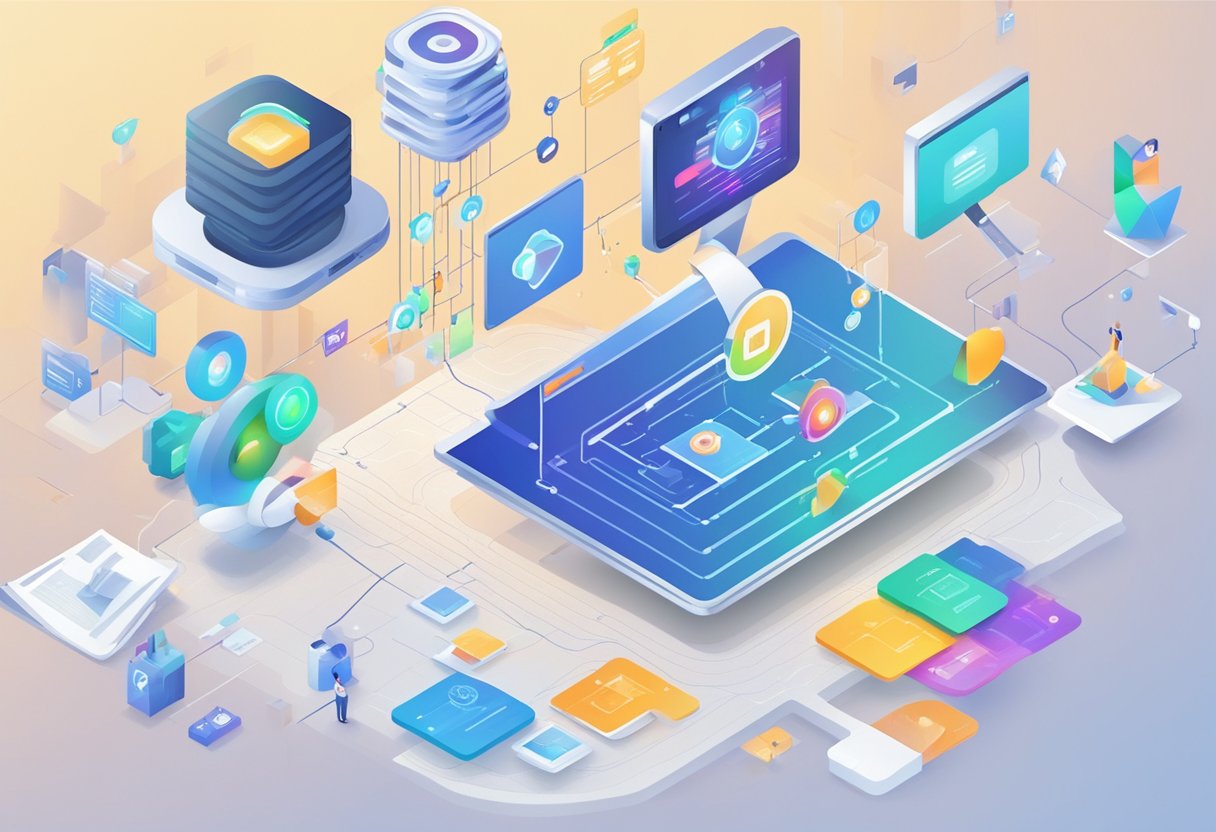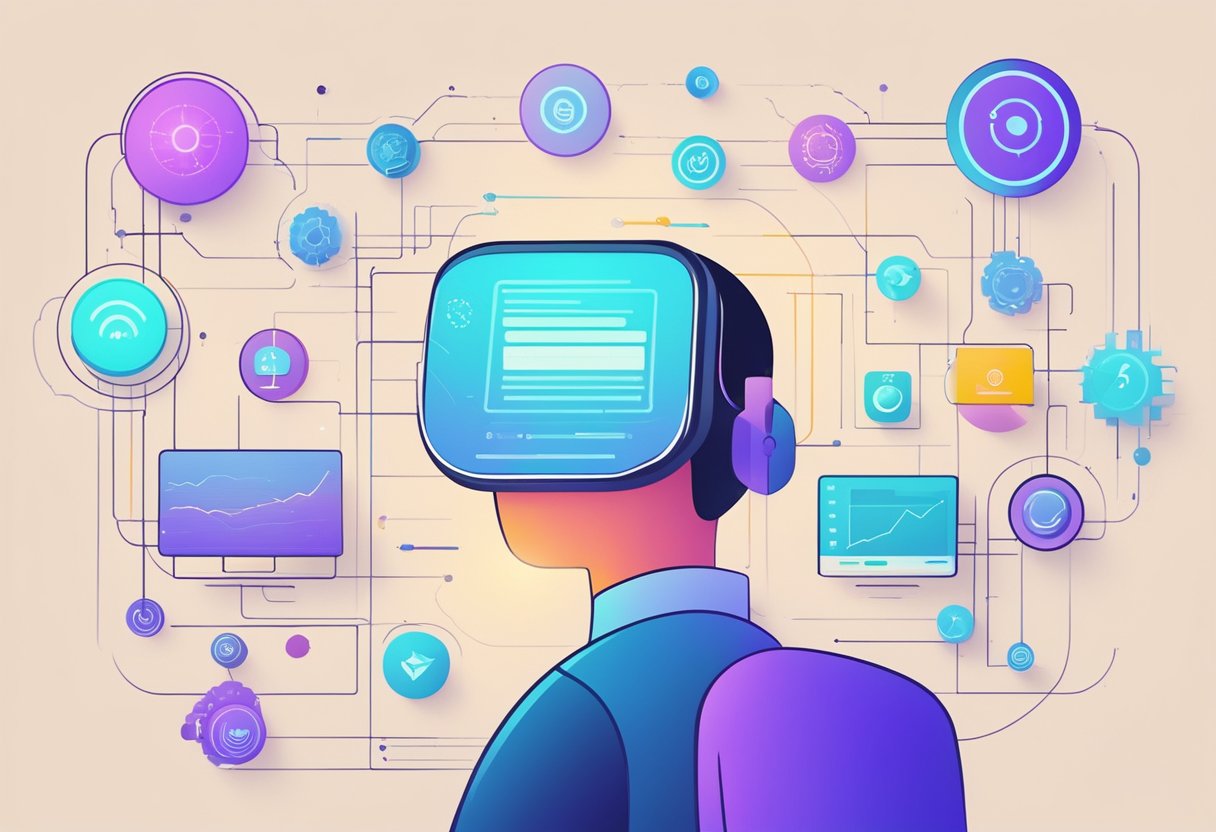How to Use AI for Digital Marketing: Strategies to Boost Your Campaigns
Artificial Intelligence (AI) is changing the way businesses connect with customers in the digital space. Marketers can harness AI tools to create personalized content, enhance customer experiences, and automate various marketing tasks. This technology not only saves time but also helps companies understand their audience better by analyzing trends and behaviors.

Incorporating AI into digital marketing strategies allows businesses to refine their approach. By using AI for tasks like content generation and customer insights, companies can deliver more relevant messages and improve engagement. The ongoing development in AI applications means marketers have endless opportunities to stay ahead of the competition.
As the landscape of digital marketing evolves, embracing AI becomes essential for success. This blog post will explore various ways to implement AI, improving overall strategy and customer satisfaction while preparing businesses for the future of marketing.
Key Takeaways
- AI enhances personalization and improves customer engagement.
- Automating marketing tasks can save time and resources.
- Understanding customer insights is crucial for effective marketing strategies.
Understanding AI and Its Role in Digital Marketing
Artificial intelligence (AI) has become a vital part of digital marketing. It helps brands enhance customer experiences and automate various tasks. This section will look at the fundamentals of AI, its applications in marketing, and the essential tools available for marketers.
Fundamentals of AI
AI refers to computer systems designed to perform tasks that usually require human intelligence. These tasks include understanding natural language, recognizing patterns, and making decisions. AI can analyze vast amounts of data quickly, enabling marketers to gather insights to better understand their audience.
Key concepts in AI include:
- Machine Learning: A subset of AI where systems learn from data to improve over time.
- Natural Language Processing (NLP): Ability of machines to understand and respond to human language.
- Predictive Analytics: Using historical data to forecast future behaviors.
By understanding these fundamentals, marketers can leverage AI to create more effective strategies.
Applications of AI in Marketing
AI is transforming how companies approach marketing. Some key applications include:
- Personalization: AI can analyze customer data to tailor messages and offers. For instance, AI tools can recommend products based on past purchases.
- Content Creation: Marketers can use AI to generate email copy, social media posts, and even blog articles, making content creation quicker and more efficient.
- Customer Service: AI chatbots provide instant responses to customer inquiries, improving engagement and satisfaction.
These applications help businesses connect better with customers and optimize their marketing efforts.
AI Marketing Tools Overview
Numerous AI tools are available to enhance digital marketing:
- Chatbots: Facilitate customer interactions 24/7.
- AI Analytics Tools: Help analyze data and extract insights, guiding marketing decisions.
- Content Generation Tools: Automate writing for social media and email campaigns.
Popular tools include:
- HubSpot: Offers AI-powered marketing automation features.
- SEMRush: Provides AI tools for SEO and content strategy.
Using these tools allows marketers to work smarter, not harder, and stay competitive.
Incorporating AI into Marketing Strategies
Incorporating AI into marketing strategies can enhance efficiency and improve customer engagement. Marketers need to develop a clear approach, integrate available tools effectively, and align AI capabilities with their specific marketing goals.
Developing a Strategic Approach
To effectively use AI, marketers must start with a strategic plan. This means defining clear objectives, like increasing brand awareness or boosting sales. They should assess past campaigns to see what worked and what didn’t. Setting measurable goals allows teams to track progress and make necessary adjustments.
A useful framework for planning might include:
- Target Audience: Identify key demographics.
- Content Goals: Decide what types of content to create.
- Performance Metrics: Specify how success will be measured, like conversion rates or engagement levels.
Integrating AI Tools into Existing Workflows
Marketers should look at how AI tools can fit into their current processes. Many tools exist to help with segmentation, personalization, and gaining insights. For example, AI can analyze customer data to segment audiences more effectively.
Integration steps include:
- Assessment of Current Tools: Identify existing marketing automation tools.
- Choose AI Solutions: Select AI tools that complement existing systems.
- Training and Support: Provide training sessions for team members to ensure smooth adoption.
Aligning AI Capabilities with Marketing Goals
It is crucial to ensure that AI capabilities support marketing goals. Marketers should prioritize features that offer the most significant impact. For instance, automation tools can streamline repetitive tasks, allowing teams to focus on strategy and creativity.
To align AI with objectives, consider:
- Customer Experience: Use AI to create personalized journeys.
- Engagement Tactics: Implement chatbots for real-time customer interaction.
- Data-Driven Adjustments: Rely on AI analytics to adapt strategies based on performance.
By following these steps, marketers can effectively incorporate AI into their strategies to drive success.
Leveraging AI for Improved Customer Insights
AI tools can greatly enhance how businesses understand their customers. They provide valuable data-driven insights, who customers are, what they prefer, and how they behave. By using advanced techniques like predictive analytics and sentiment analysis, companies can tailor their strategies to fit unique customer needs.
Predictive Analytics and Customer Behavior
Predictive analytics helps businesses anticipate future customer actions based on historical data. It uses algorithms to analyze patterns and trends, providing insights into customer preferences and behaviors.
For example, a retail company might analyze past purchases to determine what products are likely to be popular in the coming season. This allows for more accurate inventory management.
Predictive analytics also enables personalized marketing campaigns. By understanding when customers are most likely to purchase, businesses can time their promotions effectively.
Sentiment Analysis and Market Research
Sentiment analysis involves examining customer opinions and attitudes toward a product or brand. AI can assess social media posts, reviews, and survey responses to gauge public sentiment.
This analysis helps businesses understand how customers feel about their offerings. For instance, a company may discover that customers appreciate their eco-friendly practices but are frustrated with shipping delays.
Market research becomes more efficient with AI, allowing companies to gather insights faster. Businesses can use these insights to adjust marketing strategies and improve customer satisfaction.
Personalized Experience and Customer Segmentation
Personalization is crucial for engaging customers. AI enables effective customer segmentation by analyzing behavior, demographics, and preferences.
With this information, businesses can create tailored experiences. For example, an online store may show different products to users based on their browsing history.
Segmenting customers allows for targeted advertising, ensuring promotions reach the right audience. This approach increases the chances of higher conversion rates, as customers receive messages that resonate with them.
By leveraging AI for these insights, businesses can enhance their marketing strategies and foster stronger customer relationships.
Enhancing Content with AI
AI tools significantly improve how marketers create and optimize content. By leveraging advanced technologies, brands can enhance their content creation processes and provide unique experiences that appeal to individual customers.
Content Creation and Optimization
AI plays a vital role in content creation. Marketers can use AI to generate various types of content, such as blog posts, social media updates, and email newsletters. This technology enables them to create high-quality content quickly and efficiently.
Key benefits include:
- Speed: AI can produce content at a much faster rate.
- Variety: It supports different formats, from written articles to videos.
- Consistency: AI tools maintain a uniform tone and style across all content.
Additionally, AI can help with content optimization by analyzing performance data. It can identify which types of content resonate most with target audiences, facilitating informed decisions for future campaigns.
Natural Language Processing for Content
Natural Language Processing (NLP) enhances content by enabling better understanding and generation of human language. This technology helps marketers create relevant content that meets customer needs.
Applications of NLP include:
- Sentiment Analysis: Understanding audience sentiment allows for tailored messaging.
- Content Summarization: AI can summarize long articles or reports, making them easier to digest.
- Keyword Optimization: NLP helps identify high-performing keywords to boost search rankings.
By utilizing NLP, marketers can ensure their content is aligned with audience interests and improves engagement.
Dynamic and Personalized Content Strategies
AI enables the creation of dynamic content that adjusts based on user behavior. This personalization leads to improved user experiences and higher conversion rates.
Strategies include:
- User Segmentation: Using data to segment audiences based on preferences and behaviors.
- Customized Recommendations: AI suggests content based on individual user activity.
- Real-Time Adjustments: Marketers can change content as users interact with it.
Personalization has become essential in content marketing, as it drives customer loyalty and satisfaction. By implementing these strategies, brands can foster deeper connections with their audience.
Optimizing Customer Experience with AI

AI tools play a significant role in improving customer experience. They help businesses create personalized interactions, provide exceptional support, and deliver tailored recommendations. Utilizing these technologies can lead to increased customer satisfaction and loyalty.
Personalization of Customer Interactions
AI enhances the personalization of customer interactions by analyzing data. It can gather information from various sources, such as browsing history and purchase patterns. This data helps businesses understand individual preferences.
For example, email marketing campaigns can use AI to send targeted messages. When a customer shows interest in a specific product, they can receive relevant offers. Personalization increases engagement, making customers feel valued.
Additionally, AI can segment customers based on behavior. This allows for tailored experiences across different channels, such as websites, apps, and social media. By addressing customer needs specifically, businesses can build stronger relationships.
AI Chatbots for Enhanced Customer Service
AI chatbots are crucial for improving customer service. They can handle multiple inquiries simultaneously, providing instant responses. This reduces wait times and enhances customer satisfaction.
Functionality is key to effective chatbots. They can answer frequently asked questions, assist with order tracking, and resolve basic issues. Some chatbots use natural language processing to understand customer queries better, leading to more accurate responses.
Moreover, chatbots can operate 24/7, ensuring support is always available. This is particularly helpful for businesses with global customers across different time zones. With AI chatbots, companies can provide quick solutions, helping to lower operational costs and improve efficiency.
Creating Personalized Recommendations
Creating personalized recommendations boosts customer satisfaction significantly. AI algorithms analyze customer data to suggest products or services tailored to individual preferences.
Recommendation engines can track past purchases and browsing habits. For instance, an online store might suggest similar items based on what the customer viewed. This approach encourages customers to explore more products, increasing sales opportunities.
Businesses can also use customer feedback to refine their recommendations. By understanding what customers liked or disliked, AI can improve future suggestions. This adaptive learning makes the shopping experience more relevant and engaging for each user.
AI-Powered Automation in Digital Marketing
AI-powered automation is changing how businesses manage their marketing efforts. It allows for more efficient handling of repetitive tasks, leading to better time management and improved campaign results. Automation tools can optimize email marketing, improve A/B testing, and streamline various marketing tasks.
Automate Marketing Tasks Efficiently
Automation tools help streamline everyday marketing tasks. They can manage social media posts, schedule content, and track performance easily. For instance, platforms like HubSpot and Buffer automate the posting process.
By collecting data, they provide insights into audience engagement. Automating these tasks lets teams focus on strategy and creativity. They can allocate resources where they matter most.
Benefits of Automating Marketing Tasks:
- Saves time and reduces manual errors
- Ensures consistent messaging
- Provides valuable performance data
Email Marketing Automation
Automating email marketing is crucial for effective communication. AI tools can segment audiences and personalize content. This leads to higher engagement rates. Services like Mailchimp and Sendinblue allow for automated campaigns that trigger based on user behaviors.
These tools analyze customer data, enabling businesses to send timely messages. For instance, sending follow-up emails after a purchase can enhance customer loyalty.
Key Features of Email Automation:
- Pre-set triggers based on user actions
- Personalized content based on data
- Analytics to measure effectiveness
Automated A/B Testing and Optimization
A/B testing is essential for improving marketing campaigns. AI tools can conduct these tests automatically, comparing different versions of ads or emails. This allows marketers to quickly identify the most effective options.
Tools like Optimizely can test variations in real-time. They analyze the results and suggest adjustments. This optimization process is faster and relies on data, leading to more informed decisions.
Advantages of Automated A/B Testing:
- Faster testing and analysis cycles
- Data-driven insights for better campaigns
- Continuous improvement in user engagement
Using AI in these areas of digital marketing enhances efficiency, effectiveness, and overall performance.
Measuring and Analyzing Marketing Performance
Effective measurement and analysis are vital for improving marketing performance. By utilizing data-driven insights, businesses can track the success of their campaigns, enhance customer engagement, and make informed decisions. Below are key areas for focus.
Data Analysis for Marketing Insights
Data analysis is the backbone of understanding marketing performance. Marketers can gather data from various sources, including social media, websites, and email campaigns. Using tools like Google Analytics, they track metrics such as conversion rates, traffic sources, and user behavior.
Key Metrics to Monitor:
- Conversion Rates: Percentage of visitors who complete a desired action.
- Customer Engagement: Likes, shares, and comments on social media posts.
- Return on Investment (ROI): Calculating ROI helps assess the value of marketing efforts.
By analyzing this data, marketers gain insights into what strategies work best. They can quickly identify trends and make adjustments for better outcomes.
Tracking and Improving PPC Marketing
Pay-per-click (PPC) marketing is another area where measurement plays a crucial role. Marketers should regularly track their ad performance through metrics like click-through rate (CTR), cost per click (CPC), and conversion rate.
Steps to Optimize PPC Campaigns:
- Use A/B Testing: Run different ad versions to see which performs better.
- Refine Keywords: Target the best-performing keywords and remove underperforming ones.
- Adjust Budget Allocation: Shift funds to campaigns with higher ROI.
By consistently analyzing PPC data, marketers can optimize their spending and improve ad performance.
Optimizing SEO with AI
Search Engine Optimization (SEO) benefits significantly from AI technologies. AI can analyze vast amounts of data to identify which keywords attract traffic and how to optimize website content for better rankings.
AI Tools for SEO Optimization:
- Keyword Analysis Tools: Help in finding high-volume and relevant keywords.
- Content Recommendation Systems: Suggest topics based on trending searches and user interests.
- Performance Monitoring: Track search rankings and site traffic to see the impact of changes.
Through AI-driven insights, marketers can enhance their SEO strategies, improve their site’s visibility, and drive more organic traffic.
Advanced AI Applications in Digital Marketing
Advanced AI applications in digital marketing can significantly boost efficiency and effectiveness. These technologies help companies tailor their marketing efforts, optimize pricing strategies, and create engaging campaigns. Here are a few key applications.
Visual Search and Advertising
Visual search technology allows users to search for products using images instead of text. This approach enhances the customer experience by making it easier to find desired items quickly. For instance, a customer can upload a photo of a shoe and find similar styles available for purchase.
Brands implementing visual search can increase engagement and drive sales. By integrating this technology into their digital advertising strategies, companies can create personalized ads that link directly to visual content. This method can lead to higher conversion rates as it provides users with relevant options based on their preferences.
Dynamic Pricing and Lead Scoring
Dynamic pricing uses AI algorithms to adjust prices based on market demand, competitor pricing, and customer behavior. This strategy allows businesses to stay competitive and maximize profits. For example, e-commerce platforms can change pricing in real-time, ensuring that customers receive the best possible rates.
Lead scoring, on the other hand, involves assessing potential customers to prioritize sales efforts. AI analyzes user data, such as online behavior and engagement, to score leads effectively. By focusing on high-scoring leads, businesses can increase their chances of conversion and improve sales outcomes.
Generative AI for Innovative Campaigns
Generative AI tools are changing how businesses create marketing content. These tools can produce engaging social media posts, email campaigns, and even video scripts based on specific inputs provided by marketers. This technology saves time and can increase creativity in campaign development.
AI can analyze audience data to determine what content resonates most. By tailoring campaigns based on insights provided by generative AI, marketers can enhance the effectiveness of their efforts. This approach not only streamlines content creation but also allows for rapid experimentation with different messaging strategies, driving better engagement with target audiences.
AI and the Future of Social Media Marketing
Artificial intelligence is shaping the future of social media marketing in significant ways. It offers tools for targeted campaigns, enhances interactions through Natural Language Processing (NLP), and helps in influencing and tracking trends effectively.
Targeting and Social Media Campaigns
AI enhances targeting for social media campaigns by analyzing user data. It can assess demographics, interests, and behaviors to create tailored marketing strategies.
For example:
- Audience Segmentation: AI can separate audiences into distinct groups for more precise targeting.
- Ad Performance Analysis: It tracks how ads perform across different segments, optimizing them in real-time.
- Predictive Analytics: AI forecasts which target audience will likely engage based on past behaviors.
This level of targeting helps businesses maximize their marketing budgets by focusing on those most likely to convert.
NLP for Social Media Interactions
Natural Language Processing (NLP) is transforming customer interactions on social media. It allows businesses to understand and respond to customer inquiries more effectively.
Key uses of NLP include:
- Sentiment Analysis: AI analyzes posts and comments to gauge public feeling toward a brand or product.
- Chatbots: These can provide instant responses to common questions, improving customer service.
- Content Moderation: NLP can help in filtering out inappropriate content or spam from user interactions.
These applications enhance user experience, making interactions smoother and more meaningful.
Influencing and Tracking Social Media Trends
AI plays a vital role in influencing and tracking social media trends. It provides insights that help marketers stay ahead of the curve.
Important aspects include:
- Trend Analysis: AI analyzes data from various platforms to identify rising trends early.
- Influencer Identification: AI tools can find the right influencers who align with brand values and target audiences.
- Performance Metrics: It tracks engagement rates, shares, and other metrics to measure the effectiveness of campaigns.
By leveraging these insights, businesses can adapt their strategies efficiently to meet consumer demands and preferences.
Frequently Asked Questions
AI is transforming digital marketing in many significant ways. It enhances customer engagement, streamlines processes, and offers insights that are valuable for marketers. Below are common questions about the use of AI in this field.
What are the benefits of using AI in digital marketing?
AI provides several benefits in digital marketing. It can personalize content for customers, improve user experience, and forecast customer needs. Marketers find that AI tools help automate mundane tasks, allowing them to focus on strategy and creativity.
Which AI digital marketing tools are most effective for improving customer engagement?
Effective AI tools for customer engagement include chatbots for real-time communication, personalization engines that tailor content to individual preferences, and analytics tools that assess customer behavior. These tools help create a more interactive and satisfying customer journey.
How has AI shaped the future of digital marketing?
AI is shaping the future of digital marketing by enabling data-driven strategies. It allows marketers to analyze vast amounts of data quickly and gain insights into market trends. This leads to more informed decisions and better-targeted campaigns.
In what ways can ChatGPT be utilized within a digital marketing strategy?
ChatGPT can be used in various ways within a digital marketing strategy. It can assist in content creation, engage customers through chat support, and generate ideas for marketing campaigns. Its versatility makes it a valuable asset for businesses.
Can you provide examples of how artificial intelligence has been implemented in digital marketing?
Examples of AI in digital marketing include personalized email campaigns, targeted advertisements based on user data, and chatbots handling customer inquiries. These applications demonstrate how AI can enhance communication and efficiency in marketing efforts.
How can AI be integrated into digital PR and communication strategies?
AI can be integrated into digital PR by using tools for media monitoring, sentiment analysis, and content distribution. These tools help professionals track brand mentions, analyze public perception, and optimize communication efforts across different channels.




Post Comment